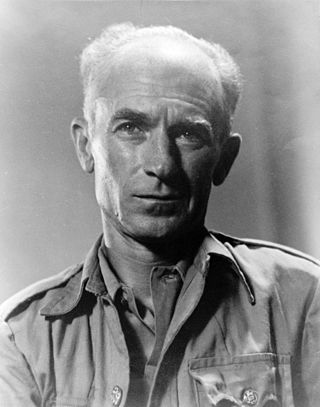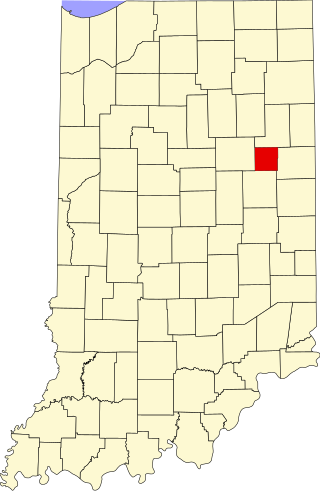
Lamar County is a county in the U.S. state of Alabama. As of the 2020 census, the population was 13,972. Its county seat is Vernon and it is a dry county. It is named in honor of Lucius Quintus Cincinnatus Lamar, a former Confederate officer and former member of both houses of the United States Congress from Mississippi.

Brewton is a city in and the county seat of Escambia County, Alabama, United States. As of the 2020 census, the population was 5,276. Brewton is located in south central Alabama, just north of the Florida Panhandle.

Hueytown is a city in western Jefferson County, Alabama, United States. It is part of the Birmingham metropolitan area, and was part of the heavy industry development in this area in the 20th century. The population was 16,776 at the 2020 census.

Ernest Taylor Pyle was an American journalist and war correspondent who is best known for his stories about ordinary American soldiers during World War II. Pyle is also notable for the columns he wrote as a roving human-interest reporter from 1935 through 1941 for the Scripps-Howard newspaper syndicate that earned him wide acclaim for his simple accounts of ordinary people across North America. When the United States entered World War II, he lent the same distinctive, folksy style of his human-interest stories to his wartime reports from the European theater (1942–44) and Pacific theater (1945). Pyle won the Pulitzer Prize in 1944 for his newspaper accounts of "dogface" infantry soldiers from a first-person perspective. He was killed by enemy fire on Iejima during the Battle of Okinawa.

Edwardsburgh/Cardinal is a township in the United Counties of Leeds and Grenville of eastern Ontario, Canada. Edwardsburgh township was first surveyed in 1783, and incorporated in 1850. The township was part of the historical Grenville County before it merged with Leeds County to form the United Counties in the 19th century.

Capon Chapel, also historically known as Capon Baptist Chapel and Capon Chapel Church, is a mid-19th century United Methodist church located near to the town of Capon Bridge, West Virginia, in the United States. Capon Chapel is one of the oldest existing log churches in Hampshire County, along with Mount Bethel Church and Old Pine Church.

Pyle is a village and community in Bridgend county borough, Wales. This large village is served by the A48 road, and lies less than one mile from Junction 37 of the M4 motorway, and is therefore only a half-hour journey from the capital city of Wales, Cardiff. The nearest town is the seaside resort of Porthcawl. Within the Community, to the northeast of Pyle, is the adjoining settlement of Kenfig Hill, North Cornelly also adjoins Pyle and the built-up area had a population of 13,701 in 2011.

Stull is an unincorporated community in Douglas County, Kansas, United States. Founded in 1857, the settlement was initially known as Deer Creek until it was renamed after its only postmaster, Sylvester Stull. As of 2018, only a handful of structures remain in the area.

Glenville is an unincorporated community in Russell County, Alabama, United States which used to be in Barbour County. During the Civil War, Company "H" of the 15th Regiment Alabama Infantry was raised from Barbour and Dale counties and called the "Glenville Guards". The Glennville Historic District, containing the antebellum core of the community, is a historic district listed on the National Register of Historic Places in 1979.

Ford's Chapel United Methodist Church, or simply Ford's Chapel UMC, is a United Methodist church located in Harvest, Alabama, in the United States. It was founded in 1808 and is the first Methodist Church established in what is now the state of Alabama.

Converse is an unincorporated community in Jackson Township, Blackford County, in the U.S. state of Indiana. Although not much of the community remains, the U.S. Geological Survey considers it a populated place. The community existed as a "flag" station along a railroad, and is named after railroad executive Joel N. Converse. Like many communities in Blackford County, this village declined after the end of the Indiana Gas Boom, which ended in the early 20th century.
Rush Run is an unincorporated community in Warren Township, Jefferson County, Ohio, United States. It is mainly around the area of Rush Run Road also known as County Road 17. It is named for David Rush who settled in that area in 1798.
Dolomite is an unincorporated community in Jefferson County, Alabama, United States. Today much of the community's residential neighborhoods lie within the corporate limits of the City of Birmingham and much of its business district lie within the corporate limits of the City of Hueytown.
Georgia Mountain is a community and small plateau in Marshall County, Alabama, east of Brindlee Mountain.

Cefn Cribwr is a village and community in Bridgend County Borough in south Wales. The village is located about 5 miles (8 km) from the centre of Bridgend town, and in-between Bridgend and Pyle.
Balkum is an unincorporated community in Henry County, Alabama, United States.
Bethel is an unincorporated community in Anderson County, located in the U.S. state of Texas. According to the Handbook of Texas, 50 people lived in the community in 2000. It is a part of the Palestine, Texas micropolitan area.
Robtown is an unincorporated community in Pickaway County, in the U.S. state of Ohio. The area is located approximately five miles west of South Bloomfield, Ohio and three miles northeast of Darbyville, Ohio, on the banks of Grave Run, a tributary of the Scioto River, and at the crossroads of Ohio State Route 316 and Turney Caldwell Road.

Benjamin Chapel and Richwoods Cemetery, also known as Richwoods Methodist Protestant Church or simply Richwoods Church, is a historic church located south of the unincorporated community of Trenton in rural Henry County, Iowa, United States. This front gable, frame church building was built by a congregation of the Methodist Protestant Church in 1877. The congregation itself was formed sometime after 1843. The building has two entrances on the main facade, one for men and the other for women. The genders then sat separately on their respective sides of the church building. The interior still has the original pews with dividers. There is also a small tower, capped with a spire, above the facade. The Methodist Protestant Church continued to maintain the building until 1921 when they sold it to the Benjamin Chapel Association. The association was named for Benjamin B. Allender, who was instrumental in building the church. Regular church services and Sunday school classes were held until 1940, and occasionally until 1952. The cemetery behind the church was a burial ground for the Methodist congregation as well as other residents from the Richwoods area. It is still an active burial ground. The church and cemetery were added to the National Register of Historic Places in 2015.

John Wesley Alstork was an American religious leader and African-American community organizer. He was a preacher and bishop in the African Methodist Episcopal Zion Church and is considered one of the most successful bishops of his church, in part due to his skills at organizing national conferences. He also was a trustee at several schools for African-Americans, and a businessman. He lived in Montgomery, Alabama.
















